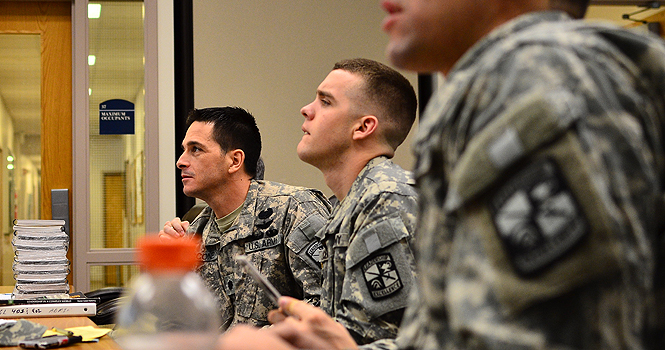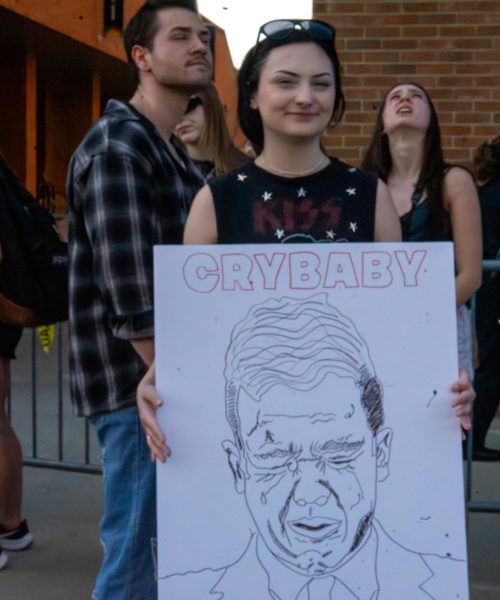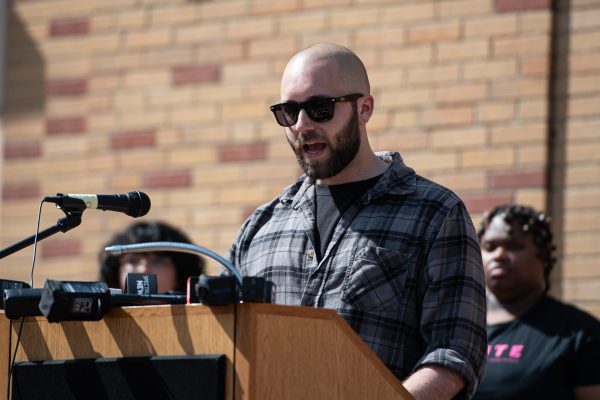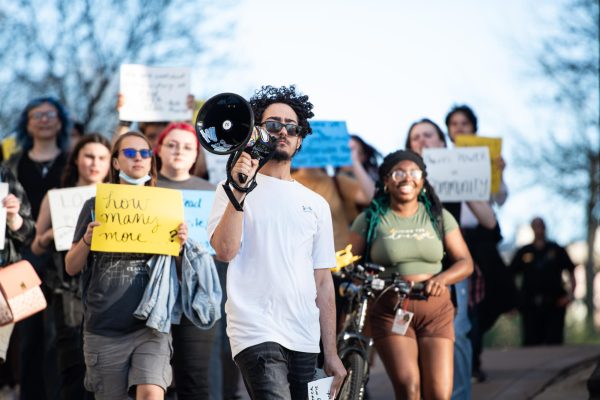Turning students into soldiers
(ABOVE:) Professor Mark Piccone in a meeting before his class in Terrace Hall on Feb. 1. Photo by Jacob Byk
February 3, 2012
Lt. Mark A. Piccone has been a professor of military science at Kent State for a year. He took the position after a distinguished career that took him all over the world.
During his career, Piccone has been stationed in several countries and honored with many awards. Now he shares his knowledge with cadets enrolled in the ROTC program.
“Right out of high school I went in to the military for four years. I enlisted and then it came time to get out of the military,” Piccone said. “I talked to some friends about getting out, staying in, what I should do and they recommended ROTC.”
He then applied and was accepted to the ROTC program at the College of Brockport, in Brockport, N.Y.
Piccone was first stationed in Germany and lived there for a total of five years. He has also been to Iraq twice, Bosnia-Herzegovina twice, Kuwait, Japan, Korea and Italy.
During his second tour in Germany, Piccone had a family: a wife and a son.
“It’s tough for family,” Piccone said. “Family members have to be strong. You have to have a strong spouse and your kids have to understand why you’re doing what you do.”
Sometimes the military family can have a hard time understanding what is going on.
“The first time he got deployed, I didn’t even know what that meant,” said Lucas Piccone, Mark’s son.
“Family back home, they’re stuck watching the television, hoping to get any kind of updates through our military channels,” Mark said. “Sometimes communications aren’t the best so you can’t always talk to them on a daily basis … and they have to understand that.”
Mark said going overseas offers soldiers unique experiences, and it can make them appreciate what they have in the United States.
He has brought his family to the different countries where he was stationed.
“We traveled a lot,” Lucas said. “It’s fun to see the world.”
Mark’s dedication and experience has awarded him many awards throughout his career in the military. He says he is most proud of his Aviator Wings that he received for attending flight school for a year.
After graduating from the ROTC program in the early ‘90s, Mark considered becoming a teacher. He taught lieutenants and captains in a previous assignment and wanted to continue teaching.
“I love being a teacher,” Mark said. “I love working with the cadets and I knew this would be a fantastic job.”
Mark landed in Kent, almost by choice of the military. Officers have to apply through the Army to become an instructor. They make a list of schools they would be interested in going to, then a board of Army Officers evaluates the applicants’ files.
“It’s a very competitive process,” Mark said. “First you get accepted to ROTC, then they select your school for you, and then they tell you what school you’re going to.”
Mark instructs cadets that are in their senior year and ready to become commissioned officers.
“I work more toward how they need to become an effective platoon leader and I basically put the final touches on them for when they leave here and they go out on their first unit,” Mark said. “We teach things such as law of war, uniform code of military justice, effective writing and how to properly evaluate and counsel your subordinates.”
Leadership skills, confidence, decision-making and the ability to adapt to other cultures are all things Mark wants his students to learn from him, and from the ROTC program.
“I want them to have confidence,” Mark said. “Also, I want them to understand that as leaders you have to lead by example.”
Mark has made a lasting impression on a lot of the cadets he has worked with.
“The major thing that I notice about him is that he cares about every single one of the cadets,” said Jessica Weinman, senior nursing major. “He wants us to succeed and do great things and he will push us to do great things as well.”
Mark says that a soldier’s career will not always be easy, but having the ability to stick it out and not quit is something that “will be with him forever.”
“Using myself as an example, after the ROTC program, you have a level of confidence in your abilities to lead, to make decisions under stressful situations and to take that decision and make it effective,” Mark said. “Hands down it’s the greatest leadership program that a college student can take.”
“They have to take pride in wearing the uniform,” Mark said. “That’s the reason I’ve been doing this for 22 years; I love being a soldier. I hope to exude that to the point that they see that and they understand it’s an honor.”
Contact Nicole Winkleman at [email protected].
























